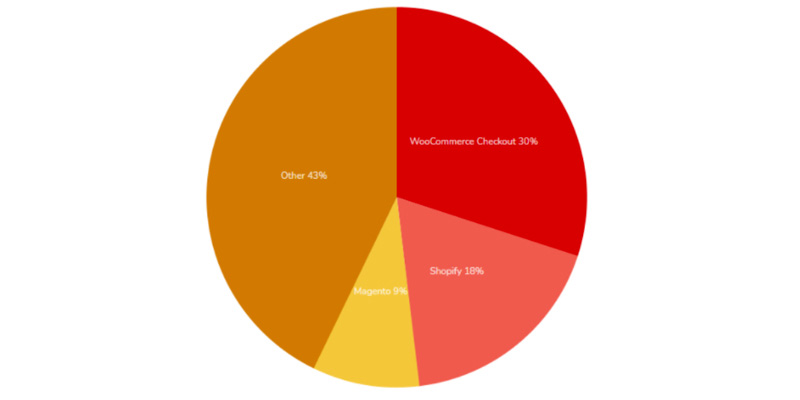The 10 Best E-Commerce Platforms to Grow your Market Exponentially
The ecommerce industry is expected to grow at a rate of 6% year on year until 2024. During the last year, ecommerce sales rose to $787.9 billion. This is more than a 30% increase over the year before. The ecommerce market itself grew by 44% in the previous year alone, based on data from the Department of Commerce. Take a look at this table to see how ecommerce sales are expected to grow in the upcoming years.

Market Share of Top E-Commerce Platforms in 2021
Now, there are several ecommerce platforms, and if you are interested in launching your own store, it’s important to choose the right one. Let’s analyse some of the most popular platforms and see how they have evolved over the years.

As you can see, WooCommerce Checkout and Shopify own a majority of the share when it comes to eCommerce platforms. Magento dominates the market, and its share has continued to increase in the past few years. Currently, it owns almost 10% of the global ecommerce market.
The entire ecommerce industry has grown dramatically over the years, and as a result, adoption rates for different platforms have also increased. For instance, in 2018, WooCommerce Checkout’s market share was around 21%. Within a couple of years, it has jumped up by 9%, and is currently at 30%. On the other hand, Shopify’s growth rate has remained stagnant at 18%. But, when you consider the fact that the entire eCommerce market as a whole has grown considerably, it’s easy to see that simply maintaining the same figures has also led to an increase of users.
The surprising change is with Magento, which has fallen from 13% in 2018 to 9% in 2020, primarily due to the increased complexity and availability of simpler platforms. The rest of the industry is dominated by platforms like BigCommerce, SquareSpace, OpenCart, Ecwid, and others.
The 10 Best E-Commerce Platforms for Exponential Market Growth
Today, there are a variety of options available for eCommerce platforms to choose from. This might, often, get a bit overwhelming for an entrepreneur. Here’s a list of 10 of the best eCommerce platforms available nowadays.
1. WooCommerce
WooCommerce consistently ranks among the top-rated ecommerce platforms, with an ever-increasing adoption rate. The company regularly introduces and updates new features as well. One reason for WooCommerce’s popularity is the fact that it is a simple, free-to-use plugin for WordPress, the most popular CMS in the digital world today. Plus, the WooCommerce platform allows you to scale your ecommerce store effectively with little to no trouble at all. WooCommerce hosting is also readily available to help improve your overall store performance and effectiveness.
2. Magento
Magento’s eCommerce platform had the 2nd largest market share in 2017 with nine percent of the global eCommerce market share. However, in 2018, the tables turned when it lost its dominance to Shopify. That gap continues to grow as Shopify has twice the adoption rate as Magento in 2021. Many Magento users switched to Shopify for an easier functionality. However, Magento offers customization that Shopify is unable to provide, which is why it’s been able to hold on to its technically proficient customer base.
This open-source platform comes with a number of tools for analytics, monitoring and conversion optimization. Magento supports both OOP and MVC architecture, which is a great deal for web developers, but not so much for the not-so-tech-savvy. It might be a challenge for users who do not have the sharp technical skills required to modify Magento, and scale their eCommerce stores effectively. But if you do have the technical expertise, Magento might prove to be an amazing online store platform for your business!
3. Shopify
Shopify is the second-largest eCommerce website platform of
2021. It promoted itself to the second spot in 2018, and has
continued to maintain its hold among its users. The majority of
eCommerce entrepreneurs are opting for Shopify, simply because
of its user-friendly interface. The integration of Amazon
services has also allowed Shopify to greatly improve its market
share. With an array of Shopify resources available online, it
is one of the best eCommerce marketing platforms for your
brand’s products and services.
However, it is a self-hosted platform. As a result, many people
who want greater freedom look for alternatives to it.
4. BigCommerce
Although BigCommerce is a comparatively new player in the ecommerce industry, it has still been growing at a whopping pace of 600% per year. While major players like Magento and Shopify have yet to cede ground, BigCommerce is doing everything it can to catch up. Their aggressive acquisition strategy has allowed them to strategically challenge the global competition, and outgrow themselves as an emerging eCommerce platform.
5. 3dCart
3dCart has been winning customers from the BigCommerce market share, but is also losing customers to Shopify at the same time. While it’s a great eCommerce platform overall, it still needs to evolve immensely. It might not be a great choice for you if you have heavy traffic coming in on your online store. Nonetheless, in the near future, we expect it to make a place for itself in the global competition.
6. SquareSpace
SquareSpace has also become incredibly popular in the past couple of years, although it is nowhere near Magento or WooCommerce levels. Squarespace gives you everything that you need to start a store, including a range of themes, customizable features, and a lot more. However, there are a few constraints that keep it from being accessible to large store owners. For example, Squarespace has limited customization features. Plus, since it’s a hosted platform, you may have a hard time choosing a better host.
7. Zyro
Zyro is another drag-and-drop builder with a host of AI tools and even a logo-maker. It has everything that you need to get your store off the ground, including a hosting platform. There’s a free version as well. However, you can’t switch templates, and the free accounts are quite limited in terms of functionality. And, you can’t schedule blog posts. But, if you need a simple skeleton of a proper eCommerce website builder, this is the sure-shot way to go.
8. Square Online
Better known as Weebly before its acquisition by Square, Square Online offers excellent value for money, as well as good enough design flexibility. Weebly still exists, and it’s ideal for smaller businesses. However, if you are running a larger eCommerce store, Square Online might be what you’re looking for. It’s got all the necessary features, including in-built marketing tools, and a dashboard that presents all the information you need at a glance.
9. OpenCart
OpenCart has lots of customizable options, and there’s no monthly subscription fee. You also get multi-store support that allows you to manage multiple stores from a single platform. It’s even got a range of flexible attributes and options- with more than 1,300 modules and themes available, it’s a great choice if you want to create custom stores.
10. Yo! Kart
Yo! Kart is a self-hosted and scalable multi-vendor eCommerce platform for building future-proof online marketplaces similar to Amazon, eBay, and Etsy. The platform has diverse in-built features such as catalogue management, multi-lingual, multiple payment gateways, BOPIS, ready mobile apps, & several pre-integrated APIs.
Unlike other eCommerce platforms like Shopify or BigCommerce, it enables start-ups, SMBs & enterprises to launch their digital marketplaces without any external plugin or app. Also, Yo!Kart comes with a lifetime license and one-time pricing model making it a cost-efficient online marketplace software.
So, which one should you choose?
It’s obviously a tough choice to make a selection with so many options available. You could go with WooCommerce if you have a WordPress website. If you want a hosted platform, Shopify might be your best match. Or, if you want something that is fully customizable and open source, you can simply go with Magento. Regardless of the eCommerce platform you choose to go with, it’s important to do your research carefully and read up on their features before you make a final choice.
Help us by filling out this form here, so our team can get started with brainstorming the most chosen eCommerce platforms right away:
Or, if you’re already using one, let us know which eCommerce platform is it? And what made you select it? Help us help others in their journey of digital transformation with digital marketing.
SSMD Pte Ltd,, July 15, 2021















